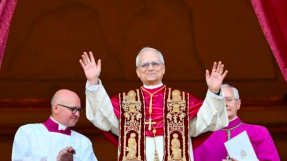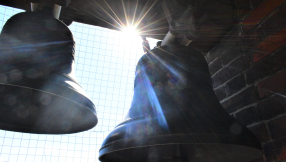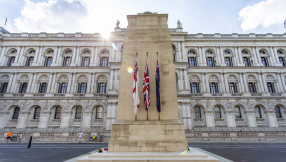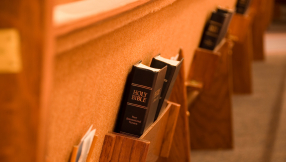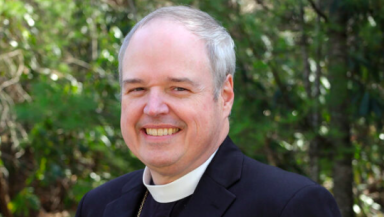
Bishop Sean Rowe of the Diocese of Northwestern Pennsylvania and the Diocese of Western New York has been named the next presiding bishop of the Episcopal Church, succeeding Presiding Bishop Michael Curry, who concludes a nine-year term later this year.
Rowe, 49, received the vast share of votes from the bishops at the church's General Convention in Louisville, Kentucky, on Wednesday. He received 89 votes when 82 votes were needed, while the four other nominees received between nine and 24 votes each. After the House of Bishops completed their votes on the first ballot, the House of Deputies confirmed the results of the election, with the bang of a gavel, cheers and applause.
Rowe, who will be the 28th and youngest ever elected presiding bishop of the Episcopal Church, became bishop of the Diocese of Northwestern Pennsylvania in 2007 and has been bishop provisional of Western New York since 2019. A native of Sharon, Pennsylvania, he is a graduate of Grove City College and of Virginia Theological Seminary. He also has a Ph.D. in organizational learning and leadership from Gannon University in Erie, Pennsylvania.
In a video posted on the General Convention website as nominees were considered, Rowe said the next presiding bishop must be attentive to voices that can "breathe fresh air and new light and life into our beloved church," helping the church "hear the testimony of the women at the empty tomb" and "recognize Jesus on the road."
The gathering of Episcopalians at the Kentucky International Convention Center in Louisville, Kentucky, has been attended by about 3,500 people, including 160 voting bishops and 829 deputies, clergy and lay representatives of more than 100 dioceses, or regional districts, of the 1.4 million-member denomination.
In his first public remarks as presiding bishop-elect, Rowe compared the shifts swirling around the church — which he said is facing an "existential crisis" — to the changes he saw occur in the Rust Belt where he watched steel industries close as an elementary school student.
"God is calling us ever more deeply into the unknown," he said. "If we're honest with each other and ourselves, we know that we cannot continue to be the Episcopal Church in the same way, no matter where we live."
As he made initial proposals about considering restructuring in the denomination to further support on-the-ground ministry, he suggested finding new ways to speak to one another as well.
"We must commit to creating a beloved community in which we can disagree with each other without shaming or blaming or tearing each other apart," he said, drawing applause. "And here's an idea: Let's use our anger at injustice instead of turning it inward on each other."
He also said that he would follow and expand on Curry's commitments to evangelism, "creation care," and racial reconciliation.
On the day before the election, the co-chairs of the committee that nominated a slate of four bishop nominees — a fifth, and the sole woman, was added through a petition process — described what a survey completed by some 6,000 Episcopalians had said about their wishes for the next bishop.
"You're looking for a strong leader — and I might add a strong leader in adaptive thinking to meet the changing church of our time," said Bishop Mark Lattime of the Diocese of Alaska, who led the committee with Dr. Steve Nishibayashi, a lay leader and retired pediatrician from the Diocese of Los Angeles. "Also looking for somebody who has a love of preaching and communicating the good news of Jesus Christ and his love. And of course, a person of strong faith."
In mid-June the Episcopal Church announced that two of the five bishops being considered for the top leadership position of the denomination were currently subjects of church discipline investigations and had previous complaints dismissed, as did a third nominee. Rowe was not among those three.
Curry, whose term ends Oct. 31, was elected the first Black bishop of the Episcopal Church in 2015. His term included preaching the sermon at the 2018 wedding of Prince Harry and Meghan Markle, being the subject of an internal clergy misconduct complaint for his response to abuse allegations of a former bishop, and enduring hospitalizations and medical treatment for a brain bleed, internal bleeding and heart conditions.
But he kicked off the weeklong meeting, which ends Friday, by declaring to Episcopal leaders that he was not worried about the future of their church.
"I'm here to tell you this Episcopal Church is stronger, more durable and has a future that God has decreed and that God has figured out," he said in opening remarks at a June 22 joint gathering of the House of Deputies and House of Bishops before legislative meetings started the next day. "And I'm here to tell you, don't you worry about this church. Don't you weep and don't you moan. Just roll up your sleeves and let's get to work. That's our future."
But at a news conference on the Friday preceding the meeting, Curry acknowledged the challenges ahead for his successor.
"Somehow our next presiding bishop in our church going forward is going to listen to what the Spirit is saying to the churches, and follow," he said. "That's not easy."
Curry sat next to his soon-to-be successor in another news conference after Rowe's election was confirmed and said his leadership of two dioceses and the new ways they've learned to share resources have served as examples for the wider church and indicators of the denomination's future.
"Whatever the new way is that God has in front of us, that's what I see in Bishop Sean Rowe," Curry said. "The capacity to help us to see and sense and discern that future, and how to put the mechanics in place, not just to talk about it. But to actually do it."
In a separate election, the president of the House of Deputies, Julia Ayala Harris of the Diocese of Oklahoma, was re-elected to her post. After defeating two other candidates, Alaya Harris, the first Latina and the first woman of color in the post, is set to begin her second term when the convention concludes on Friday.
© Religion News Service










